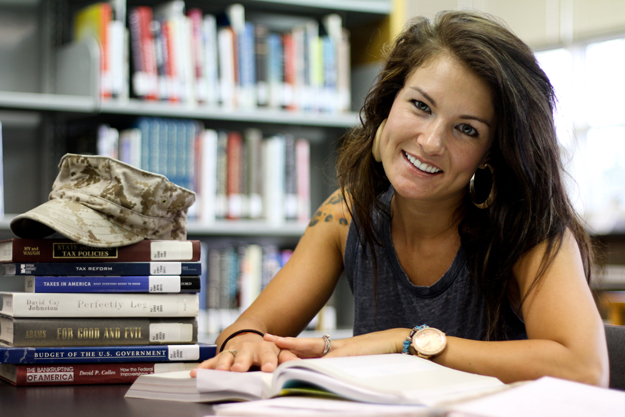Veterans in Higher Ed
Tackling classes

When Katie Joines left the U.S. Marine Corps after serving honorably for four years, her focus shifted to her civilian education.
She and her husband, an active duty Marine stationed in Jacksonville, selected Wilmington as their home for the next five years. After a thorough search, Joines picked Cape Fear Community College’s criminal justice program, somewhat a natural extension of her work with the Security Force Regiment in Norfolk, Virginia. She hopes to work in drug enforcement, ideally with the DEA.
“CFCC really caters to veterans. They provide great resources to assist vets who are returning to pursue their education,” says Joines, who is particularly grateful to Bob Philpott and Rachel Cavenaugh in the school’s veterans center. “They have been so helpful since day one and are always willing to go above and beyond to help you in any way they possibly can.”
Joines is part of a growing population of veterans entering the civilian education system after serving in the United States and overseas. As a result, local schools have beefed up their programs for veterans.
CFCC held a free, one-week orientation earlier this summer for veterans enrolling in the fall.
About 500 veterans are currently enrolled at the school, and the number is growing rapidly, says Philpott, the school’s veterans affairs coordinator.
Gail Horn, veteran services representative for the North Carolina Employment Security Commission in Jacksonville, agrees.
Horn is also a retired Marine and a student utilizing the Post-9/11 GI Bill.
“There are a ton of females going to school,” she says.
Horn entered the Marine Corps as a young adult after having taken two college classes. As she neared retirement, twenty-five years later, she began taking classes.
“I started with one class at a time while on active duty. When I got ready to retire, I buckled down,” she says.
She finished her associate’s degree while on active duty using tuition assistance, and then began a bachelor’s program that she finished as a retiree. She began her studies on the Montgomery GI Bill and converted to the Post-9/11 GI Bill. She has two years left to complete her master’s degree – something she has found challenging to do while working full time and facing family illness issues. Her plan is to re-enroll in the fall at Webster University’s extension campus at Camp Lejeune.
“You have to really want it. We have a lot of people who take time off and focus on school, and there are fantastic opportunities for that,” Horn says “There’s a VA
work-study program. You go to school three-quarters of the time.”
Under the Post-9/11 GI Bill, the federal Veterans Affairs department pays in-state tuition and $1,000 per year toward books as well as a living stipend based on the cost of living in the student’s area.
For University of North Carolina Wilmington students, that stipend is $1,212 for each month they are enrolled in the 2013-14 school year, says Shannon Miles,
veterans services counselor at the school.
UNCW currently has about 600 students using various GI Bill programs including those for spouses and children of veterans. Miles says about 225 of them are women.
Students may pursue a degree of their choice as long as the VA approves the program. UNCW has students in programs ranging from film studies and nursing to marine biology and accounting. There is a heavy concentration of students pursuing degrees in education, criminology, and nursing, Miles says.
Miles and Horn note that student veterans are encouraged to also apply for financial aid, which further alleviates the financial burden of attending school. One major destresser for Horn, she says, is knowing she will have no student debt when she completes her master’s degree.
Financial assistance is varied.
In addition to the Montgomery GI Bill and the Post-9/11 GI Bill, there are Selected Reserve and National Guard programs, survivor and dependent programs, vocational rehabilitation programs, and scholarship assistance.
Trask Land Company, led by company president Raiford Trask III, also recently launched a merit scholarship at UNCW for active-duty Marines and their family members, with preference given to Marines wounded in action or serving in special operations.
Assimilation into the student population can be challenging for some of the veterans returning to the classroom.
They have created centers for them and special events to help them find and bond with each other.
Brunswick Community College has a veterans club that meets monthly; UNCW has the Student Veterans Organization; and CFCC provides work and social space exclusively for veterans (including coffee and snacks, Joines notes).